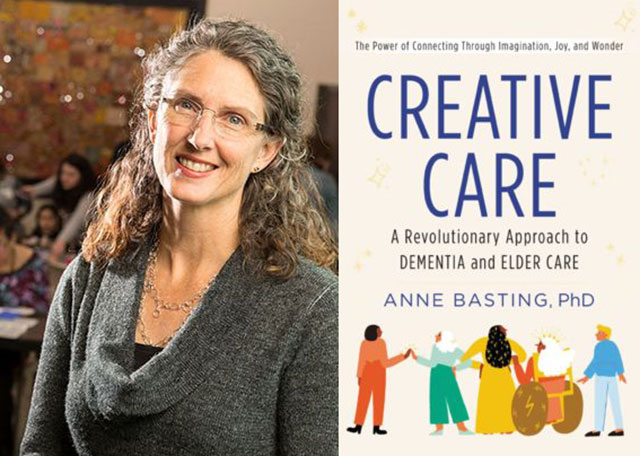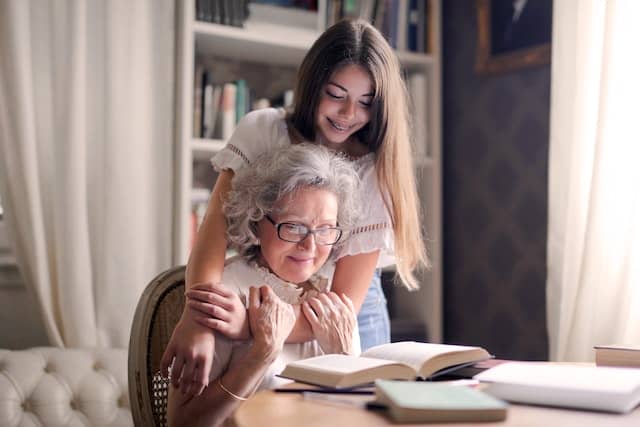Creative outlets can benefit both individuals experiencing cognitive decline and their caregivers. How can you incorporate them into your own life?
Tapping into creativity can feel out of reach for people that are navigating living with Alzheimer’s. We spoke to a neuroscientist, a former academic, and an accomplished musician about the ways they incorporated art and creative practices in their own lives. These creative outlets can offer cognitive benefits to people experiencing any stage of Alzheimer’s.
1. Dance
Dr. Julia Basso, a certified yoga instructor, dancer, and a neuroscientist at the Embodied Brain Lab at Virginia Tech spoke to Being Patient about her research studying the brain activity that occurs during dancing, yoga and other forms of movement.
Basso is passionate about exploring what the mind-body connection can do for people living with Alzheimer’s and dementia.
“There are cognitive processes as we’re engaging in choreography. There are creative and rhythmic processes, all these things. So the different areas kind of come together. They integrate. The flow of information is enhanced during dance. That’s called intra-brain synchrony, the enhancement of brain flow or brain connectivity,” Basso explained the science.
“Subsequently, when we dance with other people, we can actually enhance the link or the communication of the rhythms between two people’s brains, and that’s called inter-brain synchrony. This is something I’m really, really excited about,” Basso said.
Basso and her team study the brains of two or more people, specifically “dyads.” Basso said her research opens interesting pathways to create this inter-brain synchrony or interpersonal synchrony that is especially important for someone living with Alzheimer’s disease and their caregiver.
“Dance is increasing empathy,” Basso said. “Even with a single acute session of dance, there are impacts on the level of mental health. We see decreased levels of depression and anxiety and also increased levels of self-esteem and positive affect.”
2. Painting
Rebecca Chopp had a demanding career as the Chancellor Emerita of the University of Denver when she was diagnosed with Alzheimer’s in 2019. Since then she has become an advocate of living with Alzheimer’s, author, and pursued a new creative hobby as a painter.
Chopp, who admits she was resistant to start painting, told Being Patient how her friend, Frances, forced her to try painting.
“I had a temper tantrum for probably the first time in my life. I didn’t want to do this, but she got me to do it,” Chopp said. “I discovered that when I was painting, I couldn’t think about my Alzheimer’s. Sometimes I could feel my mind stretch, and I loved it. I didn’t worry about the products. I didn’t care about that. It was the doing and the learning.”
Chopp now encourages people with Alzheimer’s and their caregivers to find a meditative practice that works to relieve stress in their lives.
“There’s lots of research about flow and meditative practices,” Chopp said. Some people find it through music, some through gardening. I think this is good brain health to create spaces where you can go where that stress, that worry, and that fear are not there.”
3. Music
Eugenia Zukerman was diagnosed with stage 1 Alzheimer’s after her daughters became worried about Eugenia’s forgetfulness, loss of words and confusion, and insisted she see her doctor.
Zukerman uses music and writing as coping mechanisms while she navigates living with Alzheimer’s. Zukerman is an accomplished flutist and performs regularly. In November 2019, she published her sixth book Like Falling Through A Cloud: A Lyrical Memoir, that examines her journey from the initial Alzheimer’s diagnosis to the present day.
“I am very lucky that I have music deep in my soul,” Zukerman told Being Patient. “I’ve played the flute every single day since I was 10 years old and it helps me a lot. It’s the first thing I do in the morning and it’s like my shadow, it’s with me all the time.”
When Zukerman finds that relying on words is challenging for her to express herself, music fills that void. She says she can perform by “blowing across a golden mouthpiece/and there will be no words to jumble/or statements to stumble/because/sculpting sound with air/is like writing on the wind.”
Lauren Fetten lives in Los Angeles and is a graduate of Scripps College where she studied Economics and Chinese.




Unfortunately, the first instance in the audio above that claims to be the audio for this article does not match anything in this article, and the subject parts that DO match don’t match narratively, i. e., the narrative is spoken differently than the article is written.
Hi Adrienne, thank you for pointing this out. We’ve updated the article and audio now which you can find here: https://www.beingpatient.com/3-creative-outlets-for-coping-with-cognitive-decline/